Although the origin of the word Karma comes from ancient Sanskrit which is associated with ‘action, effect and fate’, and most known from Hinduism and Buddhism, it has moved across the globe and in our current modern times, the word is used so often, it could be used interchangeably with the word ‘vibe’. According to its formal definition — most notably among eastern religions — you might think of it as the totality of your actions in this lifetime (or existence) and in previous ones, the combination of which create your fate (or life’s experiences) in the future. As such, it isn’t uncommon for people to say “that’s bad karma” to someone who speaks poorly of or wishes ill upon another.
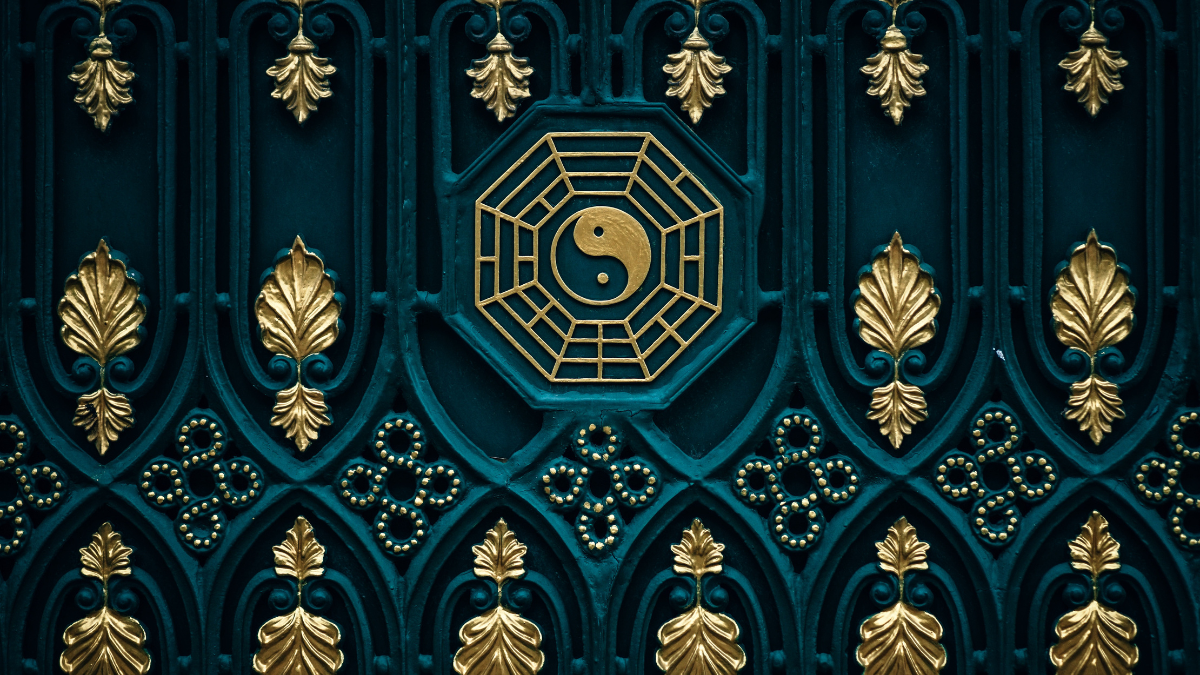
It always surprises us how often people ask about karma, whether it’s during one of our complimentary sessions, or during one of our online courses. In other words, it comes up a lot. But why are so many fixated on the notion of karma even in the west where we didn’t grow up with it, at least not in traditional Christian and Judaic circles. You see, the notion of karma exists in every tradition and belief system but it’s simply called something else. The fear-based dogma in the west taught us that if we don’t follow the scriptures, the holy books, the ten commandments or whatever else a church, synagogue or institution created as part of their teachings, then we’ll either go to hell or be judged at the pearly gates.
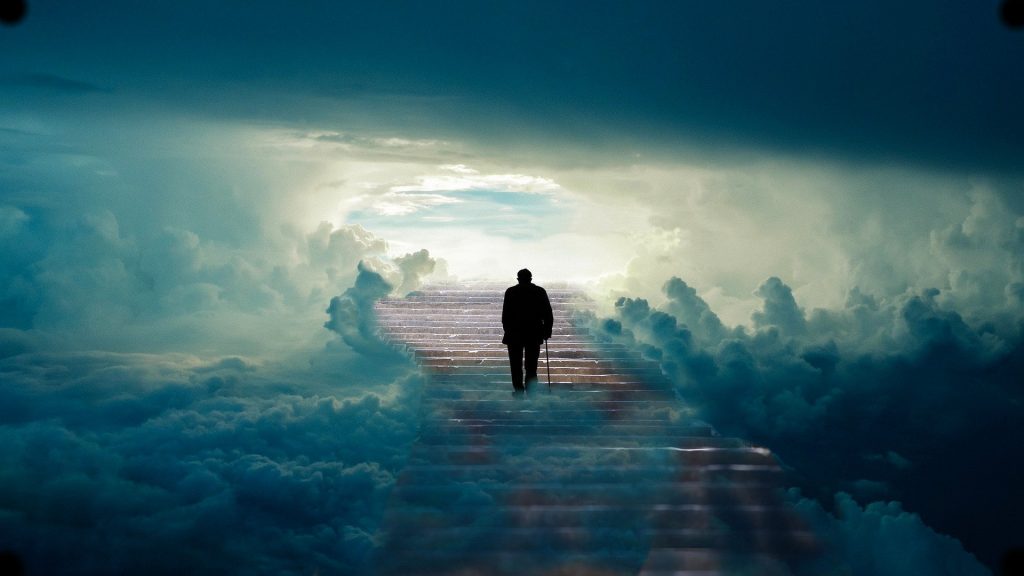
But, do the pearly gates even exist? Does karma even exist? Our guides answer this question with a yes and a no, which to our our human linear minds is about as frustrating as it gets. See our video on karma (episode 75 as part of our Blue Soul WISDOM™ series) where you’ll hear our guides speak to the ‘yes and no’ and why in a quantum universe, everything is a probability not an absolute truth because absolute truths simply don’t exist.
So, what does that mean in the context of karma?
Cause and Effect
Without going deep into a physics or philosophy lesson plan, let’s keep it simple. Whether you process cause-and-effect with science or spiritual ears depending on your belief systems, some suggest that causality exists outside time and space as we know it in this reality or dimension. Put another way, it is beyond what we can understand at this time in our evolution.
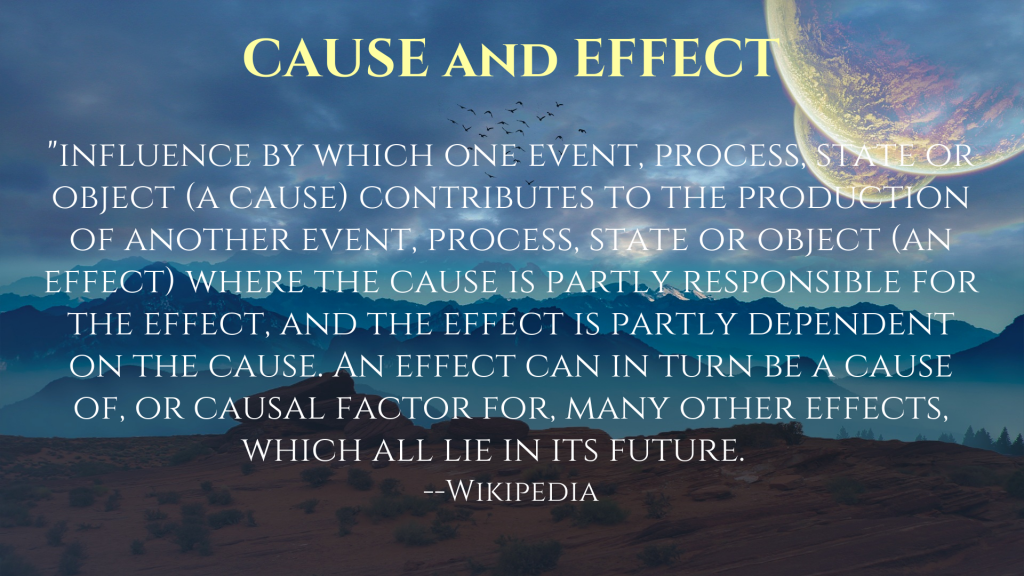
Process Philosophy suggests that “every cause and every effect is respectively some process, event, becoming, or happening and an example that is cited is ‘his tripping over the step was the cause, and his breaking his ankle the effect’.” Blow this example up or see it in a microscopic way and we can see parallels to karma in both cases. If you don’t take care when you run out of the house in a hurry, you could forget something that could cost you your job or if you drink and drive, the effect could be the loss of your own life, someone else’s or time in prison. But take in an intentional context, if you kill someone but didn’t intend do, would that yield you less negative karma than if you intentionally took out a gun in a school yard and killed dozens of innocent children?
We then get into debates on what is ‘evil’ and what is ‘good,’ something that our religious organizations have instilled for years, taking the power away from the individual and into “group think” of the organization or worst, decided by one Priest, Bishop, Pastor, Rabbi or Grand Mufti. Of course, the answer to what is ‘good and evil’ or positive and negative karma is certainly a perspective is it not? Should a Rabbi or Pastor decide? Or is it up to God to decide and if its the latter, then who or what is God?
Back to perspective and a better understanding of the Yes and No answer to whether karma exists.
Cause-and-effect didn’t just stem from philosophical thought but also in science and math as well as the metaphysics and esoteric worlds. The idea that small causes may have large effects in weather came from French mathematician and engineer Henri Poincaré and American mathematician and philosopher Norbert Wiener. e If we expand and go deeper, we get into nonlinear dynamics and deterministic chaos or chaos theory
Butterfly Effect
Out of Chaos theory comes something that has become known as the “butterfly effect” which although often exemplified by weather patterns, i.e., a small change in one part of the world can impact something on the other side of the planet and even the universe.
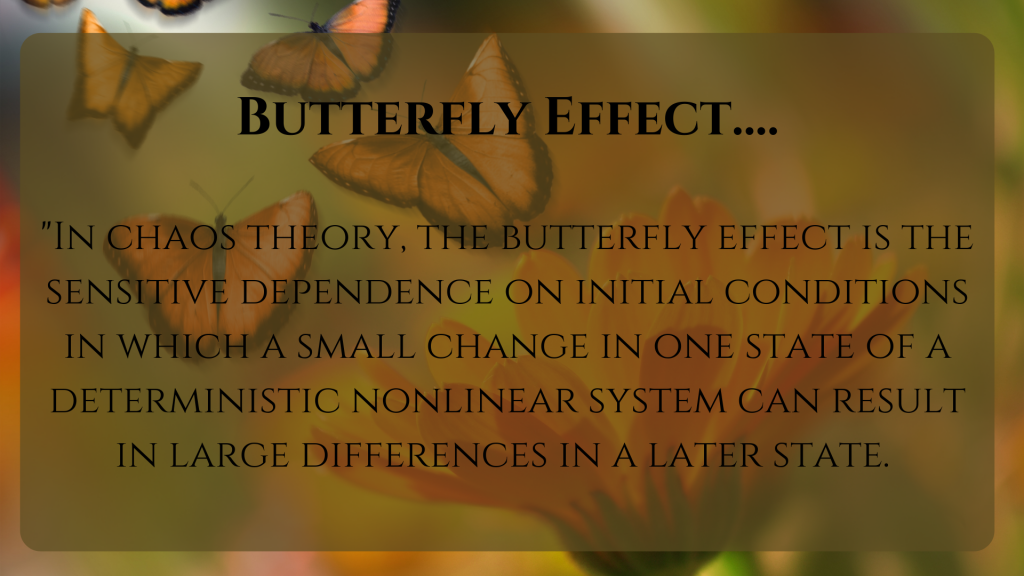
Credit: Wikipedia.
In other words, like Causality, a change in one state affects another state. Although it was coined by meteorologist Edward Lorenz in the 1960’s who saw that miniscule changes in weather patterns in one location had an impact elsewhere, it has been applied to other situations as well.
If you can get your head around the idea that we are all energy beings having a physical experience rather than material bodies that can feel with our hands and see with our eyes, then your perspective opens up to something bigger, more expansive, more universal and more whole.

As energy beings, we can see, feel and do things beyond what our minds think is possible today…..far far beyond. It starts with a belief system however and what you choose to manifest. What idea or notion do you want to give energy to? What interpretation do you want to have about who you are and what you wish to become? Will karma affect that outcome? Will you allow it to?
Perspectives. Perceptions. Illusions. Multiple Truths. Unlimited Probabilities.
What do you see in the picture below? I guarantee if we asked twenty people, the answers would be so diverse that you might wonder whether everyone involved in the exercise is actually all human.

So if perspectives vary so greatly, how can one belief system be right? How can one idea or notion be right? How can one’s truth be the only truth? It can’t. Hence the Yes and No answers our guides give us over and over again.
Is Karma true for you? If it is, then you create a reality or a life experience based on the idea that Karma IS true.
If Karma is not true for you, then you don’t give any credence to the idea that Karma is true, just in the same way that a monotheist preacher would never give credence to the idea that Gods and Goddesses like Thor, Zeus, Pele and Athena can have an impact on our lives. Remember the movie The Gods Must Be Crazy?
I’ve lived in a small African village, on a farm in New Zealand, worked on an Israeli Kibbutz and as part of my waitress job in a restaurant on a Greek village at aged 20 I broke plates as we danced for patrons every night. What is the meaning behind breaking plates in Greek culture? Symbolically speaking like most myths and legends, the ritual was meant to keep evil spirits away and also representative of tossing away an old life or way of living and starting anew, which is also why it is also done at weddings.
What is Karma to those in a small African or Greek village? I can guarantee it is different than it is for those who grew up in traditional Hindu households in India and to our indigenous brothers and sisters in North America or the Aboriginals in Australia.
So it’s all a matter of perspective isn’t it? Does Karma exist? What do you believe?
As Above, So Below
The yes part of the answer is that our actions and words DO have affect. As Above, So Below as you’ll reach about in The Kybalion, suggests that “there is always a connection or correspondence between the laws and phenomena of the various planes of Being and Life.” It has often been connected to the so called Occult Sciences, Hermes or what stemmed from him Hermeticism and Hermetism.
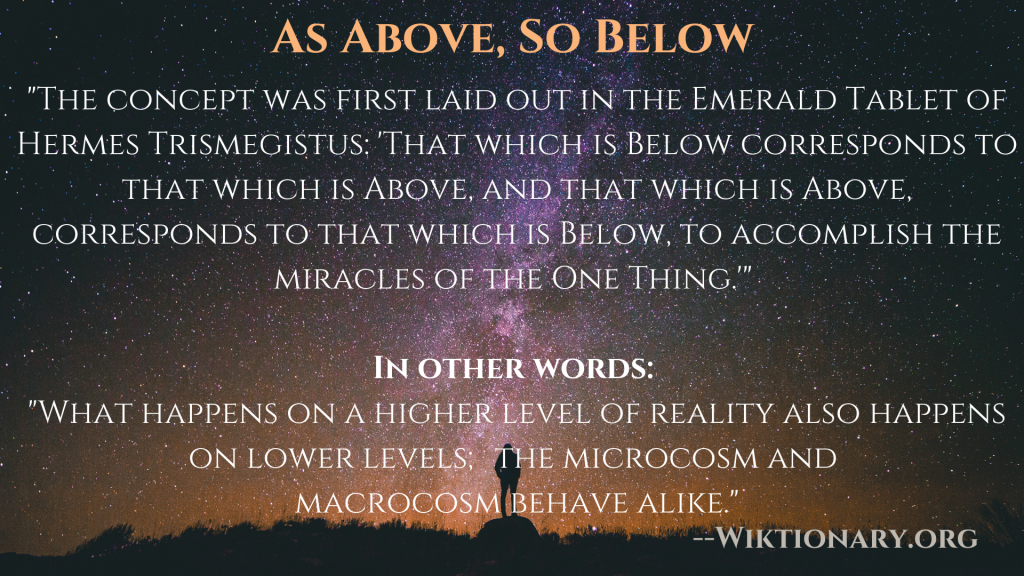
Back to philosophy again, Hermetism is said to be the teachings of Hermes Trismegistus which some say is the collective voice if you like of the Greek god Hermes and the Egyptian god Thoth. Mythological (or real — you decide) history aside, these ancient teachings that came out from around c. 300 BCE to 1200 CE offered up many ideas to stretch your linear brain, with As Above, So Below being a thought-provoking and inspiring one.
There is so much to be said about this idea that we could create an entire course on it and only touch the tip of the proverbial iceberg and yet we’ll then go down the road of analysis paralysis which often happens when we look outside for the truth. I can assure you that we’ve done the same — I’ve devoured dozens of books on Sufism, Philosophy, Paganism, Traditional Religions, the Kabbalah, the Vedas, the Kami Way, Shamanism, Santeria, Gnosticism and beyond.
Yes — “As Above, So Below” but also “As Within, So Without.” In other words, WE are the creators of our own circumstances and our own karma so that’s part of understanding the YES to the question of: does karma exist? Our inner thoughts, emotions and feelings create our outer reality so whatever is in our mind, our words and our actions will always be a mirror of what shows up in our daily lives. Our intentions have a ripple effect on our circumstances and minute-by-minute play book of our lives.
So, what about the NO part of the answer? Well, do you choose to believe in karma? Do you choose to believe that your circumstances — perceived as negative or positive — is because of karma? I purposely use the word perceived, because all of our interpretations of what is real or not real is simply a perspective or an illusion? Once we choose to move out of the illusion, then we break free of our ‘perceived’ karma. It’s simply a choice.
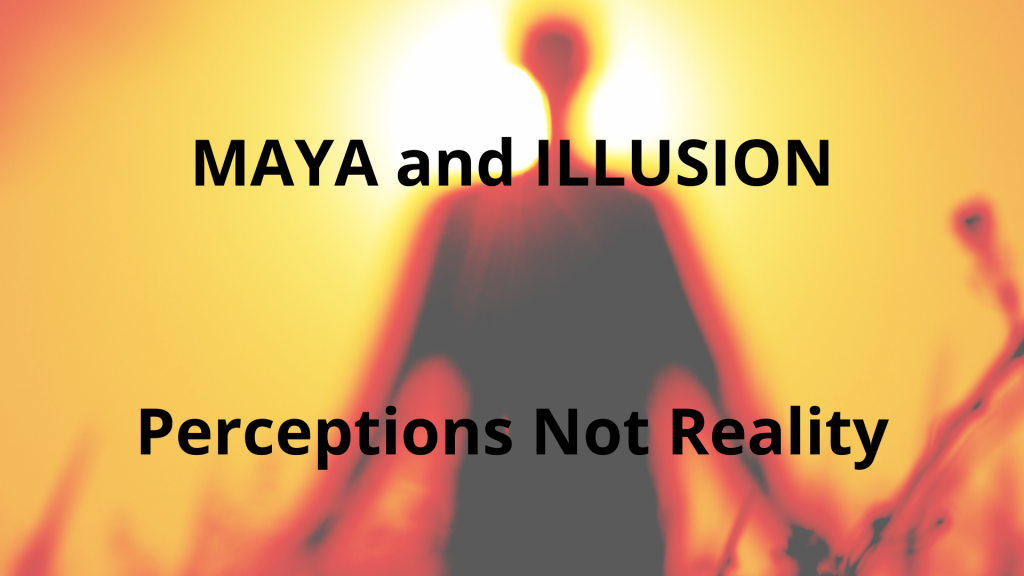
What we choose to believe in or give credence to affects the outcome of our lives — every single minute of our lives. There are massive statues of Kuan Yin, the Goddess of Mercy and Compassion throughout Asia and many who workshop her/him just as an Indian chief friend of ours honors Mother Earth, Father Sky and animal spirits.
If you give credence to (and with that credence, your energy and your time) to a belief system that by placing the Goddess Lakshmi in your office will bring your business good fortune and wealth, then you’re manifesting through that ‘energy form’. Is it Lakshmi that is doing the manifesting or is it you doing the manifesting through the energy of Lakshmi which is one of thousands of Goddesses across cultures connected to Abundance? Who is real? What is the illusion? Who is the actual creator of reality? Perhaps its both energies which is not both because each of our souls make up countless frequencies that exist beyond time and space.
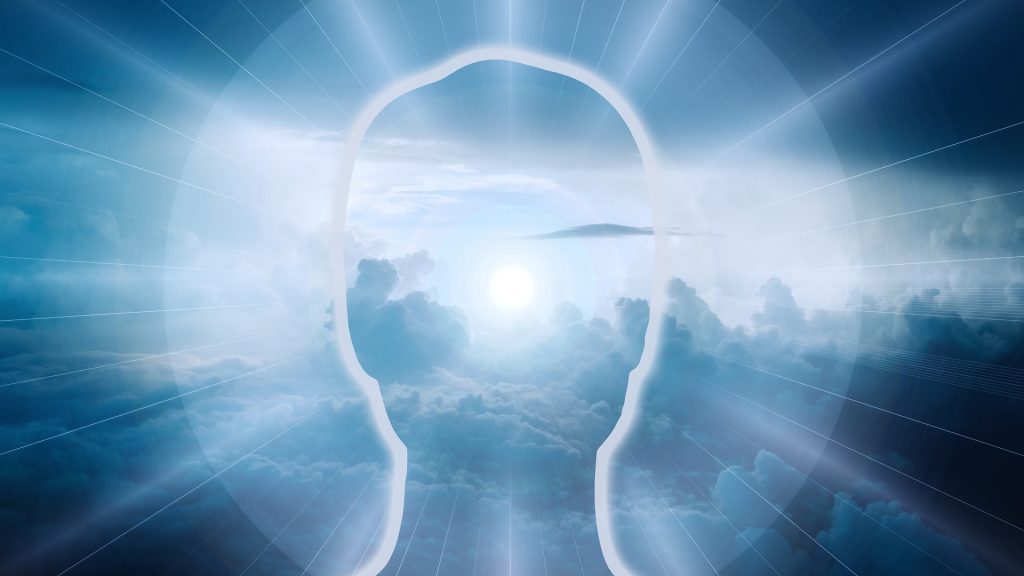
Manifesting Karma
This begs the question that is a variation from our original one. Rather than asking the questions: “What is karma or what is karma for you?” perhaps the questions should be: “Will I allow a belief in karma to affect the outcome of my daily circumstances? Will I allow a belief in karma to affect the outcome of this life experience?”
Every outcome we manifest ourselves, but it starts with a belief system and then follows with a decision. In the moment of one decision, a new probability and reality starts to unfold in this wacky and surreal quantum universe of ours. Whether you belief in karma (or not) or whether you believe in string theory, multiverses and the ability to fold space and time (or not), we make a choice each and every moment of what to spend our energy on. The more energy we give to something, the more materialized it becomes. As humanity did with Gods and Goddesses, they do with the unfolding of their so called material lives.
What do you choose to manifest in your life and will you allow karma to get in the way of that creation?
If we can turn back the pages to the oldest and wisest sages of our time — across cultures and borders — it always seems to come back to the present moment and honoring and respecting the oneness with nature and all living things. Whether you connect to the teachings of a Shintō priest, a Sufi poet, a Kabbalist, a Pastor, a Gnostic Philosopher or an Indigenous Elder, consider the value in the present moment, the here-and-now.

The present moment is a magical place to live.
It is in this place, that you seek nothing and your anxiety dissipates and becomes smaller as you no longer sweat the small stuff. The endless chase for meaning is seized in the present moment and the mind becomes still. You become one with everything around you and nature takes on a new meaning.
You can see the dew on the leaf as if its for the very first time. You can feel all the stages of a butterfly’s life in a single breath as it passes you by. As you sip your morning cup of coffee, rather than fixate on your woes, you can see the colors of a rainbow in your mind’s eye and it becomes more real and alive than the material world you have always perceived to be the only “real.” You begin to see yourself in a movie as a character in a play who has been defined by someone else’s “truth” rather than your own soul’s “truth.”
Your daily symphony of life changes in that moment of decision. A new song begins and this time, it’s your song. Your soul’s song, one you choose to breathe in with excitement, joy, compassion and love for yourself and….for others. For in your symphony, there is no evil and good, there is no negative or positive karma ready to entrap you or release you, there is no Almighty, Allah, God or Krishna to judge you, there is no one reality or one truth.
Perhaps just like the most complex yet most beautiful orchestra or play you have ever witnessed, all moments that have led you to this point in your life are perfect as they are. As it is.
Perhaps it is so.
Perhaps in that moment of decision, you can make it so. And once you do, rather than focusing so much of your energy and time on karma, you may just discover that it is being replaced by a new thought and focus: Love and the Interconnectedness of All That Is.
When you begin to live from and be of present moment, gratitude will fill your heart and abundance and love will follow in all forms they manifest. This too is cause-and-effect but perhaps one that exists in vibration and energy only,…one without a name.

Renee Blodgett is the founder of We Blog the World. The site combines the magic of an online culture and travel magazine with a global blog network and has contributors from every continent in the world. Having lived in 10 countries and explored over 90, she is an avid traveler, and a lover, observer and participant in cultural diversity. She is also the founder of the Magdalene Collection, a jewelry line dedicated to women’s unsung voices and stories, and the award-winning author of the bestselling book Magdalene’s Journey
She is founder of Blue Soul Media and co-founder of Blue Soul Earth as well as the producer and host of the award-winning Blue Soul CHATS podcast, that bridges science, technology and spirituality. Renee also founded Magic Sauce Media, a new media services consultancy focused on viral marketing, social media, branding, events and PR. For over 20 years, she has helped companies from 12 countries get traction in the market. Known for her global and organic approach to product and corporate launches, Renee practices what she pitches and as an active user of social media, she helps clients navigate digital waters from around the world. Renee has been blogging for over 16 years and regularly writes on her personal blog Down the Avenue, Huffington Post, BlogHer, We Blog the World and other sites. She was ranked #12 Social Media Influencer by Forbes Magazine and is listed as a new media influencer and game changer on various sites and books on the new media revolution. In 2013, she was listed as the 6th most influential woman in social media by Forbes Magazine on a Top 20 List.
Her passion for art, storytelling and photography led to the launch of Magic Sauce Photography, which is a visual extension of her writing, the result of which has led to producing six photo books: Galapagos Islands, London, South Africa, Rome, Urbanization and Ecuador.
Renee is also the co-founder of Traveling Geeks, an initiative that brings entrepreneurs, thought leaders, bloggers, creators, curators and influencers to other countries to share and learn from peers, governments, corporations, and the general public in order to educate, share, evaluate, and promote innovative technologies.








